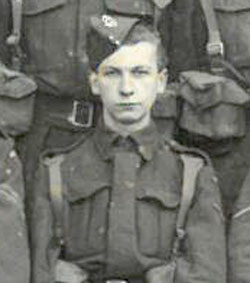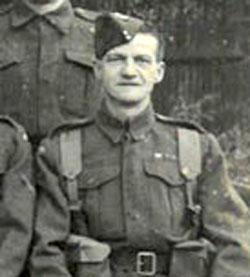The 10th Middlesex
Battalion was responsible for the
Southall area and
was commanded
(in 1941)
by Lt.-Col. G. Moss,
D.C.M.
This
page contains an image
showing No.3 Platoon
of "A" Company
of that Battalion, on an unknown date;
and also information on some of the men in the
photograph.
 
Cpl. Walter
(Jack) Durham
(1894-1980, right), a survivor of the Great
War, is seated on the extreme right
and his son, L/Cpl. Edward (Ted)
Durham
(b.1923, left), fourth from the right in the same
row.
The Platoon Commander is remembered
as Captain Toye but may well
have been Lt. C. W. Tee.
He is one of the
two officers seated in the middle of the front
row, 8th from the right and next to the officer
with the RFC/RAF wings on his tunic. 7th from
the right is the Platoon Sergeant,
Sgt. Betts.
Family affiliations within
individual Home Guard units were common – fathers
and sons, brothers. (Captain Harry Myers commented on
this in his record of the earliest days of his own Platoon, No. 5, "B"
Company, 32nd Staffordshire (Aldridge) Battalion,
as follows: ".......Fathers
bring sons - a graceful compliment to the unit....").
The affiliation between Jack and Ted, shown above,
is however not wholly straightforward. Jack Durham
had served in the Great War in the Royal Field
Artillery. By the outbreak of war in September 1939
he was an electrical inspector, employed at EMI in
Hayes. At that
time EMI assumed responsibility for other factories
and Jack found himself working in another EMI factory
somewhere in London. It was there that he must have
volunteered for Home Guard service and he became a
member of a Kent battalion. At a later date,
perhaps because of some unknown change in
circumstances, we see him above as now part of the
10th Middlesex where his son has been serving for
some time.
Ted Durham's
own circumstances within the Platoon were also
unusual. Within his family there was a memory of his
having been selected as part of a force to provide
continuing resistance after invasion and occupation.
This however does not imply membership of one of the
once highly secret Auxiliary Units; these were
usually formed much nearer to the coastal areas than this
part of Middlesex. But Ted certainly received
special training. In the words of his son after a
recent (October 2018) conversation:
"He
re-affirmed that he had been selected as one of a
‘cadre class’ for special training. This
involved two members of each platoon in the Company,
so possibly ten in all. They would gather for
training under the direction of a Regular Army Staff
Sergeant or WO2, normally on local golf courses or
woods. He recalled one occasion ‘Right L/Cpl Durham,
imagine a machine gun post there, I want you to lead
your men to take it out’. It appeared that the
leader for each exercise was chosen on the day..."
Further memories of the Platoon's activities
and Ted's part in them are also recorded:
"...Company training weekends took
place at
Bisley
and
Borden under
Regular Army Sergeants. Accommodation was in
bell tents. He recalled drill sergeants
addressing the officers: ‘Come sir, keep in step
with your men, you’re part of the Unit!'.
Initially, they didn’t have a Company HQ
as such, but then they moved into barracks that had
been vacated by a searchlight battery on the
Uxbridge Road, Southall.
Only it hadn’t been totally vacated – there were
still some miscreants held in the guardhouse,
meaning it couldn’t be used. So it was a case of
mattresses on the Drill Hall floor. This was
the era of ‘stick patrols’, as they hadn’t been
issued with rifles.
Battalion HQ was at
Norwood Green .
Dad remembers that close to one of the guard duty
posts was one of the old green gents urinals.
This would flush at unpredictable times during the
night, causing alarm at least to those on
duty.........."
|